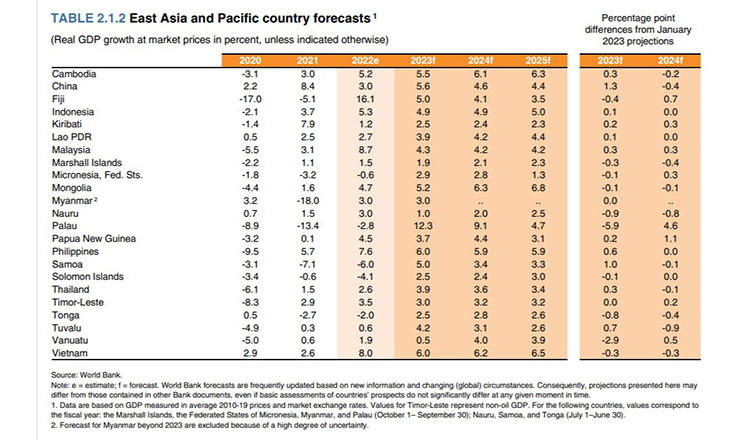Tighter global financial conditions may impact Cambodia
Tighter-than-expected global financial conditions could have widespread adverse effects on the East Asia and Pacific (EAP) region, including Cambodia, according to the World Bank’s ‘Global Economic Prospects – June 2023’.
The tighter financial conditions could stem from a combination of further global banking sector turmoil and heightened investor risk aversion or from tighter-than-expected monetary policy in major advanced economies,
The bank pointed out that tighter global financial conditions could weigh on global growth and external demand and further dampen regional trade and activity.
“It could also reduce capital inflows and lead to currency depreciations, which could be particularly costly for countries with large external borrowing needs or where external debt is high by EMDE (emerging market and developing economy) standards (Cambodia, Mongolia),” the World Bank report said.
“Currency depreciations, possibly associated with slowing capital inflows, could also give additional impetus to domestic inflation, forcing central banks to raise interest rates, compounding the drag on growth from existing policy tightening,” it warned.
While external borrowing in EAP is generally lower than in other EMDE regions, overall debt levels have ratcheted up over the past decade due to increased borrowing by governments, households, and non-financial corporations.
While the bank increased Cambodia’s growth forecasts in 2023 by 0.3 percentage points from its January 2023 projections to 5.5 percent, it reduced 2024 projections to 6.1 percent, down 0.2 percentage points.
The bank also projected 6.3 percent GDP growth for the Kingdom in 2025.
While analysing the observations in the World Bank report, Jayant Menon, Senior Fellow with ISEAS-Yusof Ishak Institute in Singapore, told Khmer Times yesterday: “Compared to its earlier report released in January 2023, the latest World Bank report forecasts stronger world growth for 2023 and lower growth in 2024. This is true for most countries, but not for Cambodia. Although Cambodia is expected to grow slightly more strongly this year at 5.5 percent, it bucks the global trend to continue to grow strongly next year at 6.1 percent.”
“This is despite rising risks globally with rising interest rates forecast in the US, stubbornly high inflation, continuing US-China tensions and the ongoing Ukraine-Russian war,” he pointed out.
Meanwhile, growth in the EAP region is projected to strengthen to 5.5 percent in 2023 from 3.5 percent in 2022, as a recovery in China offsets slowing activity in most other regional economies.
Growth in the EAP region excluding China is set to slow to 4.8 percent in 2023 from 5.8 percent in 2022, as the boost from earlier reopening fades in several large economies.
The bank pointed out that regional trade growth will remain subdued amid weak global demand and domestic services-led growth in China.
In 2024, growth in EAP is projected to ease to 4.6 percent as the effects of China’s reopening fade.
“Downside risks to the outlook include tighter-than-expected global financial conditions; stubbornly high inflation; protracted weakness in China’s property sector; geopolitical tensions; and, particularly for smaller economies, natural disasters, including climate-change-related extreme weather events,” it indicated.
However, the services trade benefited from a continued recovery in global tourism, boosted by tourists from China taking advantage of the reopening of borders.
“Headline consumer price inflation has declined from recent highs in most countries and is lower than in other emerging market and developing economy (EMDE) regions, partly reflecting spare capacity along with price controls and subsidies,” it said.
Indermit Gill, Senior Vice President and Chief Economist, World Bank Group, said: “The World Bank’s latest projections indicate that the world economy will remain frail—and at risk of a deeper downturn—this year and in 2024. Our baseline scenario calls for global growth to slow from 3.1 percent in 2022 to 2.1 percent in 2023, before inching up to 2.4 percent in 2024. Even this tepid growth assumes that stress in the banking sector of advanced economies does not spill over to EMDEs.”
Source: https://www.khmertimeskh.com/501304268/tighter-global-financial-conditions-may-impact-cambodia/


 English
English




